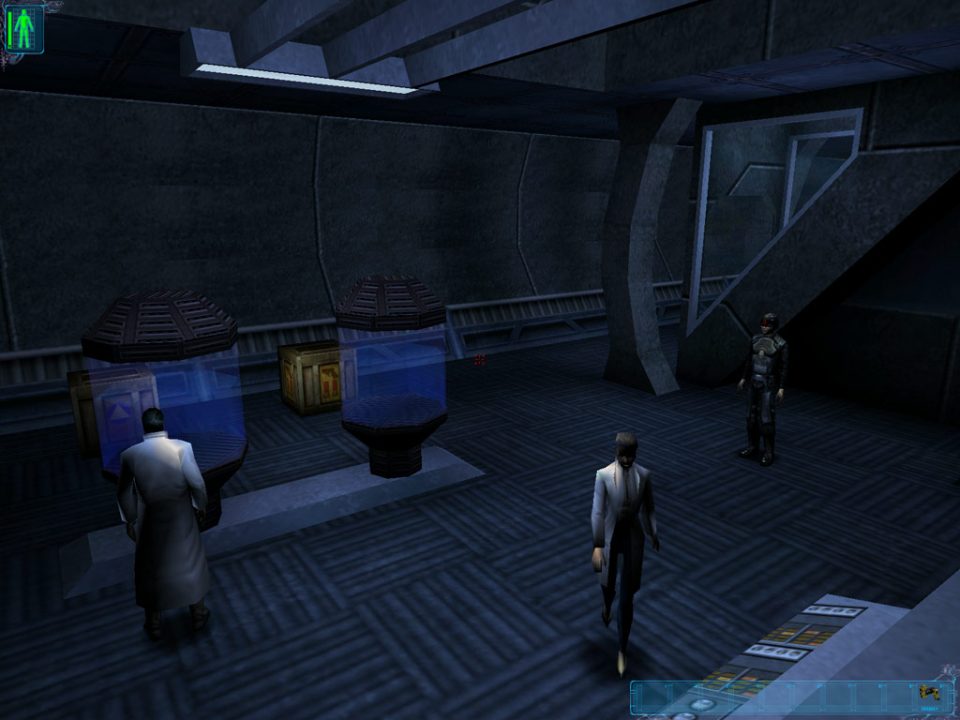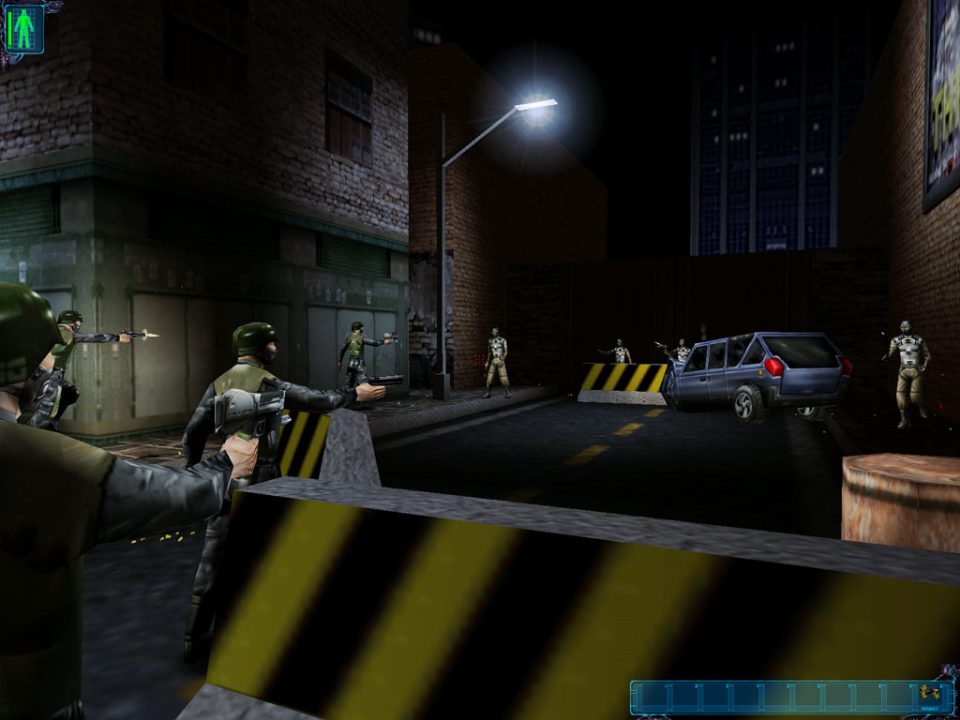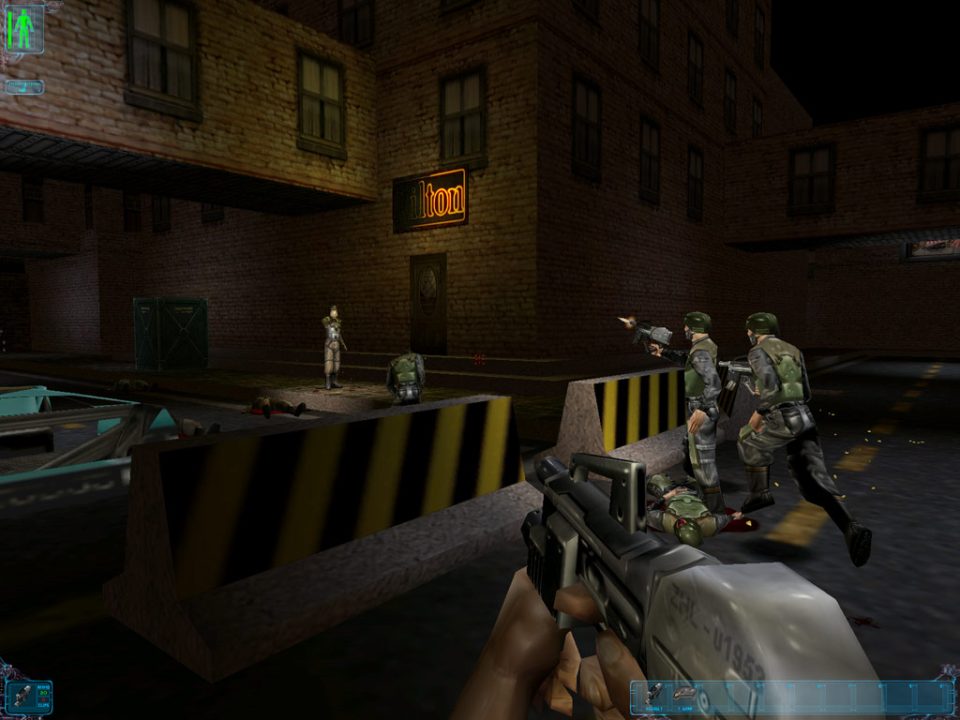[Editor’s Note: June 23rd, 2025 marks the 25th anniversary of the original Deus Ex. In honor of this, we have asked our review team to offer fresh looks at all four mainline games in the series. Be on the lookout for those later this week!]
Twenty-five years ago today, we were given a glimpse into the dark future. A looking glass into a world very much like our own, yet steeped in rampant experimental technology, domineering corporations, despotic governments, and shadowy, far-reaching conspiracies running through all of it. While there are echoes of those descriptors in today’s world, Deus Ex perhaps didn’t set out to be such a prescient work from the outset. Yet, their foresight into the 21st century is downright eerie at times.
Basically, imagine a world where every conspiracy theory you’ve ever heard is all simultaneously true. That’s essentially the setting of Deus Ex.
You play as JC Denton, a newly minted agent for UNATCO, the United Nations Anti-Terrorism Coalition. We learn right away that JC’s placement into the agency is a decision viewed with equal parts fervor and fear since he and his brother, Paul, are UNATCO’s (and the world’s) first nano-augmented humans.
While biomechanical augmentations such as robotic arms and legs are widely represented and accepted as a part of society in 2052, nano-augmentations are less familiar to the populace as a technology, making JC and Paul outcasts of a sort in Deus Ex society. The feeling is compounded by the fact that the nanites allow their users to do things humans normally could not, namely, turn invisible and perform feats of superhuman strength.
Together with Paul, JC’s first mission for the agency involves thwarting an attack on Liberty Island by the radical terrorist group NSF (National Secessionist Forces). From this, you soon find out that Paul has betrayed UNATCO and defected to the NSF for reasons unknown. What follows is a rollercoaster political thriller plot full of twists and turns at every interval as JC uncovers a conspiracy that reaches all the way to the top and beyond.
On its own, Deus Ex‘s story is a very campy, pulpy one. I don’t mean that as an insult, but rather that it doesn’t try to take itself too seriously and is capable of having fun with its premise, thanks mostly to JC’s dry wit and deadpan delivery. If you were to read the game’s broad plot strokes as a novel, for instance, removed from all gameplay contexts, you might find it somewhat dull and uninspired. However, it’s those very gameplay contexts that made Deus Ex a one-of-a-kind narrative experience and what keeps it in such high regard to this day.
Above all else, the reason for this narrative/gameplay success is that Deus Ex functions as an immersive sim. While it certainly wasn’t the first, Deus Ex is what many consider to be the finest example of its subgenre. You see, an immersive sim is defined as being “driven by its systems.” In many ways, it’s the polar opposite of linearity in a game design sense. Immersive sims encourage full, untethered player exploration and experimentation. It essentially takes the phrase “there are no wrong answers” as a core design principle—players can tackle each of Deus Ex‘s levels and many objectives in whatever order and by whatever means they desire.
The number of times I asked a question starting with “I wonder if I can…” only for the game to immediately answer that I could is frankly staggering. This happened on every level of Deus Ex, from something as innocuous as skipping past a particularly taxing locked door by blowing it up to shortcutting entire questlines by making a series of story or gameplay decisions in a certain order. It really exemplifies how remarkable and ahead of its time Deus Ex is.
Despite being the blueprint for most beloved immersive sims of the 21st Century (Dishonored, Prey 2017, Vampire: The Masquerade – Bloodlines), Deus Ex is still roundly considered the best in the genre, and for good reason. It’s a reactive, tactile world that engages the player in a tug-of-war with its systems to see what works and what doesn’t, in ways that few games can match, even to this day.
When it comes to approachability, that’s where Deus Ex loses a lot of people. It’s not entirely the game’s fault, only that it hails from an era of gaming where RPGs were more niche and could afford to take a lot more risks by design. With every detail, it’s clear that the team built Deus Ex for an enthusiast audience more than the average casual consumer. Further supporting this idea, the PS2 port, Deus Ex: The Conspiracy, had to redesign many of the game’s fundamentals to the point where one could argue that it’s an entirely different gameplay experience.
In my opinion, Deus Ex doesn’t put its best foot forward in onboarding new players. True, it has a training mission (accessible from the main menu) that’s fairly robust and extensive in explaining all of the game’s mechanics and ways to exploit them; however, the opening Statue of Liberty mission throws players in the deep end with a fairly tricky scenario and level layout and lets you have at it without a gradual build-up to get more intimately acquainted with its systems.
Now, I acknowledge that there probably is an optimal way to tackle this level that more or less covers those criteria, but newcomers wouldn’t be privy to that info, leading to a rather poor first impression. In fact, I put off playing Deus Ex for a long time precisely because the opening level is so overwhelming. Anecdotally, I’ve heard the same from others, too. While I’m grateful I pushed past it for this review and to celebrate the game’s 25th anniversary, I can easily see myself not bothering otherwise and continuing to play the series’ modern installments instead.
Again, this isn’t necessarily the game’s fault; in many ways, Deus Ex is a relic of its time, genre, and platform. Its open-ended playground design is both a blessing and a curse. It can be very intimidating for those unfamiliar with the other immersive sim RPGs that preceded it, like Thief: The Dark Project, System Shock 1+2, and Ultima Underworld: The Stygian Abyss, a game widely considered to be the original imsim.
It also doesn’t help that stealth, while still mostly reliable, fleshed out, and providing options and alternative routes for each of Deus Ex‘s 13 levels, can occasionally behave differently than you want or expect. Granted, this generally only applies to sneaking around enemies, with the game being touchy about what counts as “hiding in the shadows” or not. Thankfully, taking a stealth approach is merely one of dozens of potential strategies, and even then, stealth still functions well enough at the best of times.
In totality, Deus Ex presents as a game that’s a mile wide and five miles deep. Many of its components, on the surface, may not look like much, but when you take them apart and see how many moving parts there are, you can truly appreciate their worth.
This principle applies to its level design, systems, story, and every facet of its gameplay. The gunplay, for instance, can be initially very frustrating. Not just in a modern context either, since surely many FPS fans were used to the Quake, Half-Life, and Unreal school of shooters, which Deus Ex does not approach. That’s not for a lack of capability, but more than it’s just a different kind of shooter. Really, it’s tricky to say that it is a shooter at all. It’s a lot more deliberate, calculating, and strategic.
The more you play the game and invest in certain weapon skills, the more you realise that each of Deus Ex‘s arsenal of guns serves a specific purpose and can be useful in specific situations. In summary, the less you treat it like a shooter, the more you’ll appreciate its combat for what it is.
The same is true of Deus Ex‘s story. Sure, it’s a hokey, hammy cyberpunk political spy thriller with the occasional corny line of dialogue, odd line delivery, or the uncomfortable racist depiction of Chinese people in the Hong Kong level. Yet, despite that, it’s still incredibly clear that its themes, messages, and almost Nostradamus-like foresight into 21st-century politics, technology, and socioeconomics resonate even now.
This “mile wide, miles deep” principle arguably extends even to its soundtrack. Initially, I found some of its tracks to not be much. I even found some kind of annoying and repetitive. Yet, I kept coming back to them and found myself humming along as the levels went on. Straylight Productions truly indoctrinated me, and over the course of the game, I came to love the ambient, darksynth sound. Apparently, even game director Warren Spector had the same experience as I, initially becoming irritated by the main theme before catching himself humming along to it constantly.
For those who have yet to play the original Deus Ex, whether due to lack of interest, being overwhelmed by the opening mission, or the fact that it’s nothing like Human Revolution or Mankind Divided, I highly encourage you to give it another, proper go, and try and meet it where it is and not where you’d ideally want it to be.
More than many classic games I’ve gone back and played, while it may seem dated on the surface, Deus Ex is more than meets the eye and stands tall as one of those universally acclaimed video games that’s well and truly earned its reputation and placement in the annals of gaming history. Its influence resonates far and wide in the industry today, inspiring countless games and helping to usher in a new era of Western RPGs.
For the optimal (or, shall we say, “augmented“) way to play Deus Ex today and still have a vanilla experience, I cannot recommend Deus Ex Community Update highly enough (which is how I played it). It’s a compilation of quality-of-life mods that fix some essential issues, provide widescreen support, and don’t really interfere with the game’s systems. Otherwise, the new PS2 Classics re-release of the PS2 version of Deus Ex on PlayStation Plus can be a suitable, albeit somewhat different, experience that still comes impressively close to matching up with the PC version.






